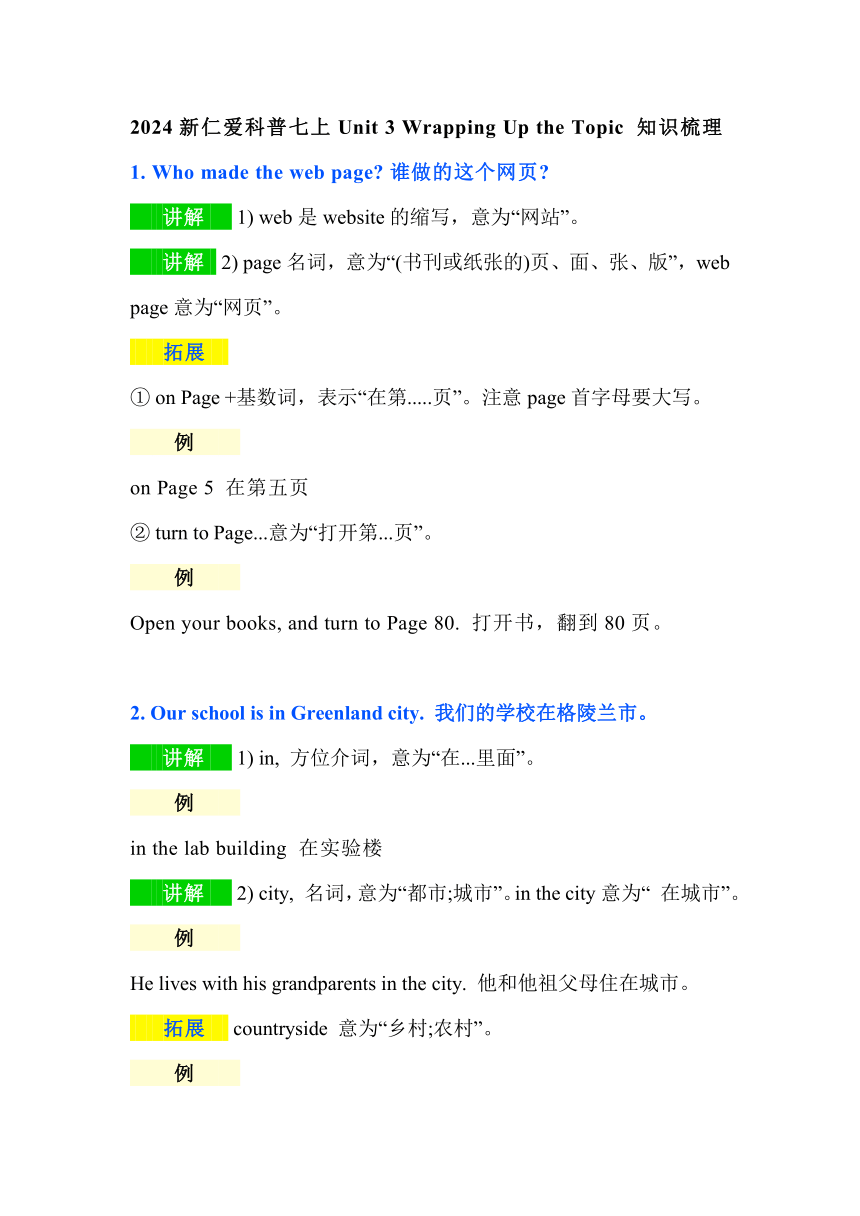
2024新仁爱科普七上Unit 3 Wrapping Up the Topic 知识梳理 1. Who made the web page 谁做的这个网页 讲解 1) web是website的缩写,意为“网站”。 讲解 2) page名词,意为“(书刊或纸张的)页、面、张、版”,web page意为“网页”。 拓展 ① on Page +基数词,表示“在第.....页”。注意page首字母要大写。 例 on Page 5 在第五页 ② turn to Page...意为“打开第...页”。 例 Open your books, and turn to Page 80. 打开书,翻到80页。 2. Our school is in Greenland city. 我们的学校在格陵兰市。 讲解 1) in, 方位介词,意为“在...里面”。 例 in the lab building 在实验楼 讲解 2) city, 名词,意为“都市;城市”。in the city意为“ 在城市”。 例 He lives with his grandparents in the city. 他和他祖父母住在城市。 拓展 countryside 意为“乡村;农村”。 例 Li Ping lives in the countryside. 李萍住在乡村。 3. It has a history of 32 years. 它有32年的历史。 讲解 “have/has a history of+数字+年”,意为“有....年的历史”。 例 China has a history of over 5,000 years. 中国拥有5千多年的历史。 辨析 have a history和have a history class has/have a history →拥有一段历史,其后面接介词of。 have a history class of →上历史课。 例 Our school has a history of 100 years. 我们学校有100年历史。 We have a history class today. 我们今天有一节历史课。 4. And there are lots of clubs in our school, such as art club, sports club and music club! 而且我们学校有很多俱乐部,比如美术俱乐部、体育俱乐部和音乐俱乐部! 讲解 lots of 意为“许多的;大量的”,后跟可数名词复数或不可数名词,可与 a lot of互换。 例 There are lots of books in this shop. 在这家商店有大量的书。 5. Students can learn a lot and have great fun here. 学生们可以在这里学习到很多并玩得很开心。 讲解 have great fun意为“玩得很开心;获得很大的乐趣”,与其意思相似的有have a lot of fun。其中fun在这里作不可数名词,意为“乐趣,享受”。 例 We will have a lot of fun in the park. 我们将会在公园玩得很开心。 拓展 fun作为不可数名词构成的短语有: for fun 为了好玩 in fun 开玩笑地 make fun of sb ./sth. 取笑某人/某物; 拿....开玩笑 full of fun 充满乐趣 6. Welcome to find out more about our school! 欢迎查询更多关于我们学校的信息! 讲解 1) welcome (sb.) to do sth. 意为“欢迎(某人)做某事”,其中sb.常常省略。 例 Welcome (you) to visit our school. 欢迎(你)来参观我们学校。 注意 “welcome (sb) to +地点名词”意为“欢迎(某人)来到某地”,是表示欢迎某人到某地时的常用语。但与home、here、 there 等表示地点的副词搭配时,welcome后不加介词to, 即“welcome +地点副词”。 例 Welcome to our school. 欢迎来到我们学校。 Welcome home, my dear! 亲爱的,欢迎回家! 拓展 welcome的用法: 作形容词,意为“受欢迎的”。 作感叹词,意为“欢迎”。 用于“You're welcome.”中,表示“不必客气”。 作名词,意为“欢迎;接待”。 例 He is a welcome student. 他是一个受欢迎的学生。 -Thank you very much. 非常感谢。 -You' re welcome. 不客气。 Welcome to Beiing! 欢迎来到北京! They give me a warm welcome. 他们给以热烈的欢迎。 讲解 2) find out (about) sth./sb. 意为“查明,弄清(情况)”。 例 ... ...
~~ 您好,已阅读到文档的结尾了 ~~